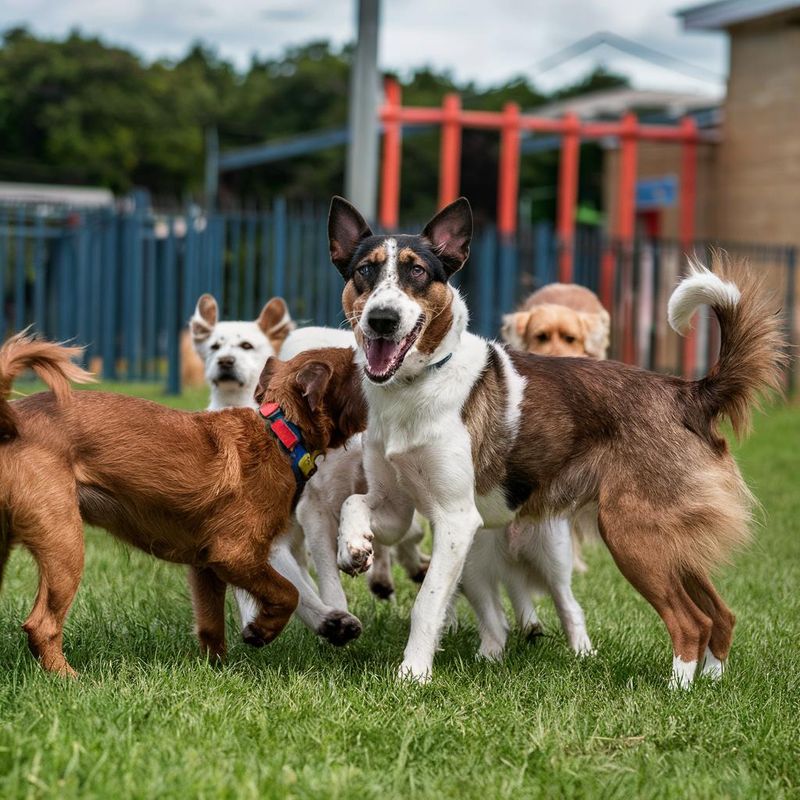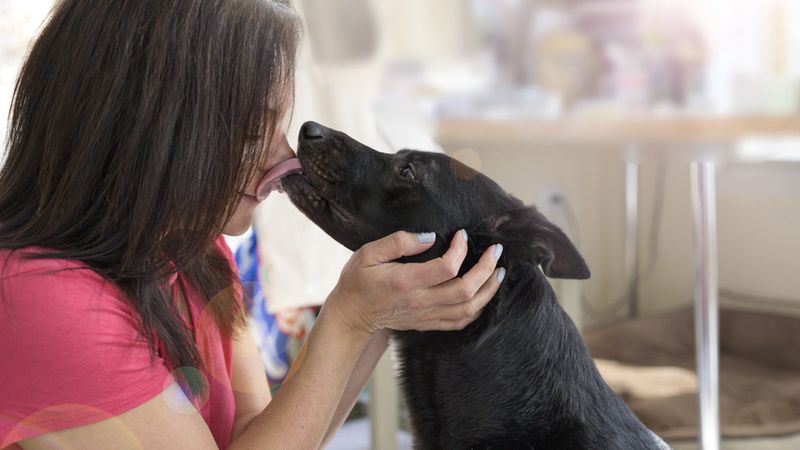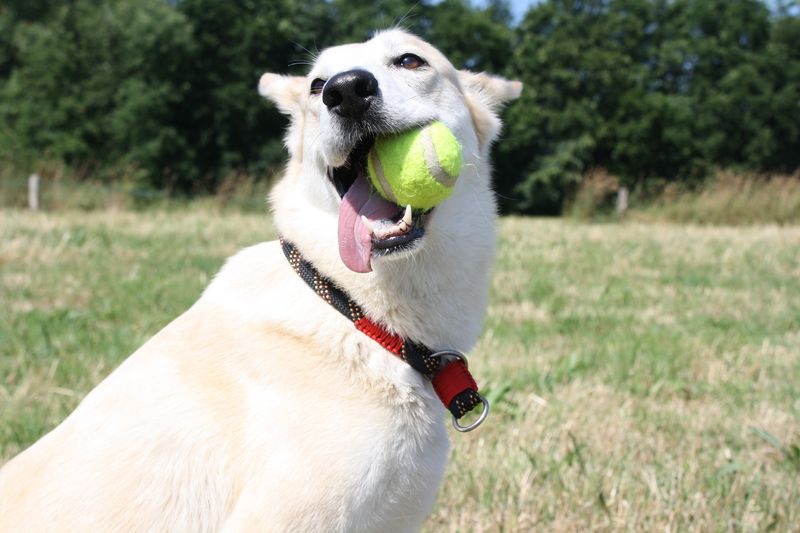Explore the fascinating world of canine emotional intelligence through the lens of 15 unique signs that suggest your dog may possess above-average emotional acumen.
From their ability to empathize with human emotions to their adeptness in social interactions, dogs display a range of behaviors that indicate a deep understanding of their surroundings.
This blog post highlights these traits as observed by canine behaviorists, offering insights into the remarkable intelligence that our four-legged companions exhibit.
Empathy for Human Emotions

Dogs have a unique ability to sense their owner’s emotions. When you are feeling down, your dog might sit by your side, offering silent support. Their empathic nature allows them to connect deeply with humans.
Many owners report that their dogs seem to understand their feelings. This emotional resonance demonstrates a high level of awareness.
A dog’s ability to empathize with human emotions is a clear sign of their emotional intelligence. This connection strengthens the bond between dogs and their human families, showcasing their caring nature.
Recognizing Vocal Cues

Have you ever noticed how your dog tilts its head when you speak? This isn’t just a cute gesture—it’s a sign of their intelligence. Dogs are keenly aware of vocal cues and can pick up on subtle changes in tone.
This ability allows them to understand basic commands and interpret your mood.
Recognizing vocal cues goes beyond obedience; it reflects their capacity to engage with humans on a deeper level. A dog’s attentive listening shows their desire to communicate and connect with us.
Adaptive Social Skills

Dogs with high emotional intelligence have exceptional social skills. They can adapt their behavior to suit different social situations. Whether playing with other dogs or interacting with various animals, they know how to adjust.
These dogs can read social cues and respond appropriately. Their ability to navigate complex social dynamics is a testament to their intelligence.
This adaptability helps them form strong bonds with both humans and animals, showcasing their understanding of social environments.
Problem-Solving Abilities

Dogs that exhibit strong problem-solving skills often have high emotional intelligence. Given a challenging task, they approach it with curiosity and determination. Puzzle toys and games quickly become opportunities for mental exercise.
These clever canines enjoy figuring out problems, displaying patience and persistence.
Their problem-solving abilities reflect their capacity for critical thinking. This intellectual curiosity keeps them engaged and entertained, proving their cognitive prowess.
Sensitivity to Household Changes

Dogs with above-average emotional intelligence are highly sensitive to changes in their environment. A new piece of furniture or a different routine might catch their attention.
They notice these changes and may react by investigating or showing curiosity.
This sensitivity helps them adapt to new situations, highlighting their awareness and intelligence. They quickly adjust to maintain harmony within the household, proving their perceptive nature.
Capacity for Forgiveness

Forgiveness is not just a human trait; dogs possess this capacity as well. A dog that quickly forgives a minor mishap, such as an accidental step on its paw, shows emotional maturity.
Their willingness to let go of grudges reflects deep emotional intelligence.
This ability to forgive strengthens their relationship with humans, enabling trust and affection to flourish. A forgiving dog exemplifies a balanced emotional state, crucial for a harmonious living environment.
Reading Human Body Language

Dogs are adept at reading human body language, an essential skill for understanding intentions. Observing gestures, they can respond to commands or anticipate actions.
This skill goes beyond simple obedience; it illustrates a dog’s ability to comprehend non-verbal communication.
Dogs’ keen observation skills enable them to engage with humans more fully, enhancing their role as companions. Their ability to read body language showcases their intelligence and awareness.
Emotional Resilience

Dogs with high emotional intelligence demonstrate resilience in stressful situations. Whether it’s loud fireworks or a bustling crowd, they maintain composure.
This calm demeanor is not just about temperament; it’s about emotional strength.
Emotional resilience allows dogs to cope with challenging environments, showcasing their adaptability and intelligence. Their ability to remain calm under pressure makes them reliable companions, admired for their steadiness.
Joyful Playfulness

A joyful, playful dog often exhibits a keen sense of emotional intelligence. Their ability to engage in play reflects understanding and connection.
Playing with children or other dogs, they adapt their energy and excitement.
This playful nature is more than mere fun; it’s an expression of their emotional engagement. Playfulness reveals their joyful spirit, a delightful aspect of their intelligence that endears them to others.
Fear Response Management

Dogs with above-average emotional intelligence manage their fear responses effectively. Faced with an unfamiliar object, they exhibit curiosity rather than immediate fear.
Their inquisitive nature leads them to explore rather than retreat.
Managing fear responses demonstrates emotional control, a sign of intelligence. This ability to face the unknown with curiosity highlights their bravery and mental strength, earning admiration from their human companions.
Understanding Human Routines

Dogs that understand human routines exhibit remarkable intelligence. Anticipating their owner’s return, they might wait eagerly by the door.
This awareness of time and routine shows their ability to connect with human schedules.
Understanding routines allows them to adapt to daily life seamlessly. Their anticipation and excitement reflect a deep emotional bond, illustrating their role as attentive companions.
Expressing Gratitude

Dogs expressing gratitude are often emotionally intelligent. After receiving a treat or affection, they might respond with wagging tails and loving gestures.
This expression of thanks strengthens their bond with humans.
A dog’s ability to express gratitude showcases their emotional depth. It reflects a mutual understanding and connection, adding richness to the human-animal relationship. Their thankful nature is a heartwarming sign of their intelligence.
Protective Instincts

With a vigilant eye, dogs exhibiting protective instincts demonstrate their emotional intelligence. They sense potential threats and position themselves to guard their loved ones.
This instinctual behavior goes beyond mere aggression; it reflects loyalty and awareness.
Their protective nature assures safety and trust, creating a secure environment. This aspect of emotional intelligence reinforces their role as dedicated companions, admired for their guardianship.
Ability to Comfort

Dogs that can comfort others possess a high level of emotional intelligence. Sensing distress, they offer their presence to soothe and reassure.
Their calming influence extends to children or adults alike.
This ability to comfort is a cherished trait, highlighting their empathetic nature. Their presence provides solace, reinforcing the emotional bond they share with humans. Dogs’ comforting abilities enhance their role as compassionate companions.
Recognizing Personal Space

Dogs with emotional intelligence understand the concept of personal space. Respecting boundaries, they know when to approach or give you room.
This awareness of space shows their perceptive nature.
Recognizing personal space reflects their ability to connect with human emotions and needs. It enhances their role as considerate companions, valued for their understanding and respect.

